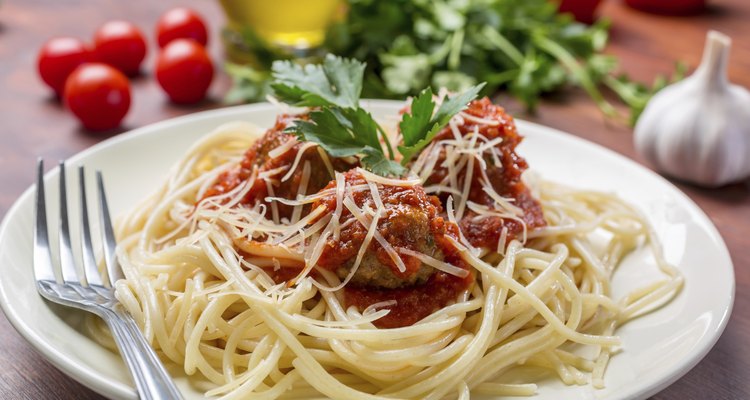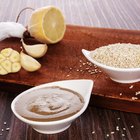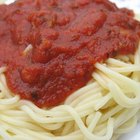
olgna/iStock/Getty Images
Marinara sauce, the a combination of well-cooked crushed tomatoes and vegetables, such as onions, celery, carrots and garlic, is often used as a topping for pasta. This sauce, also sometimes called tomato sauce or tomato gravy, is fairly good for you, although you may need to look for low sodium varieties if you monitor your sodium intake.
Nutrition Basics
A half-cup serving of marinara sauce contains 82 calories. Eating this sauce by itself is possible but not common – you’ll more likely top a plate of pasta with it or serve it as a dip with mozzarella sticks or other fried foods, so account for all the calories when planning a meal. Marinara sauce is quite low in fat, with 2.7 grams per serving. A serving provides 14.2 grams of carbohydrates and 3.1 grams of fiber as well as 3.8 grams of protein.
Vitamins and Minerals
Marinara sauce is a rich source of vitamin C. Each serving provides 67 percent of the daily recommended value based on a 2,000-calorie diet, making marinara a good choice for promoting a strong immune system. You also take in 40 percent of the vitamin A you need each day as well as 10 percent of the iron and 7 percent of the calcium when eating marinara sauce. The vitamin and mineral content of tomatoes in marinara sauce may have benefits for diabetics. Research published in the December 2010 issue of the “International Journal of Food Sciences and Nutrition” reported that eating tomatoes may help lower the risk of hypertension. The researchers theorize that this can help diabetic patients lower their chances of developing cardiovascular disease, a risk factor for diabetes.
Lycopene
Because tomatoes feature heavily in marinara sauce, the sauce contains a high level of lycopene. This nutrient has antioxidant effects, and it may also help prevent a range of cancers. Evidence in the December 2010 edition of the “Journal of Oral Pathology and Medicine” indicates that the lycopene in marinara sauce may stop oral cancer by treating premalignant lesions in the mouth. More research is needed to support these findings.
Health Considerations
Despite marinara’s overall health and nutritional benefits, this sauce contains 497 milligrams of sodium per serving. A healthy person may consume up to 2,300 milligrams of sodium per day, although the American Heart Association recommends a limit of 1,500 milligrams for both healthy people and those who have hypertension or who are at risk for elevated blood pressure. Watch your portion size when consuming marinara sauce to avoid consuming too much sodium.
Related Articles

How Can I Counteract the Sourness of a ...

Chili Sauce Substitutes
How Many Calories Are in Peanut Sauce?

How to Freeze Tzatziki

How to Make Fish Taco Sauce

Things to Do With Prego Sauce

Calories in Pimento Cheese

How Long Can You Refrigerate Nacho ...

Nutrition Information on Blueberries

Calories in Tahini Sauce

How to Store Pasta Sauce

A Good Substitute for Hoisin Sauce

How to Freeze Yogurt Sauce

How to Make a Fruit Reduction

How to Tone Down Spiciness in BBQ Sauce

The Ingredients in Chipotle Sauce

How to Freeze Marinara Sauces

How do I Make Turkish Chili Sauce?

Can You Use Half & Half Instead of ...

The Calories in Broccoli With Garlic ...
References
- Food Network: Marinara Sauce Recipe
- Fitbit: Marinara Sauce
- University of Maryland Medical Center: Vitamin C (Ascorbic Acid)
- International Journal of Food Sciences and Nutrition: The Effects of Tomato...Diabetic Patients
- Linus Pauling Carotenoids
- Journal of Oral Pathology and Medicine: Lycopene Features and Potential...Precancerous Lesions
Resources
Writer Bio
Nicki Wolf has been writing health and human interest articles since 1986. Her work has been published at various cooking and nutrition websites. Wolf has an extensive background in medical/nutrition writing and online content development in the nonprofit arena. She graduated with a Bachelor of Arts in English from Temple University.
Photo Credits
olgna/iStock/Getty Images